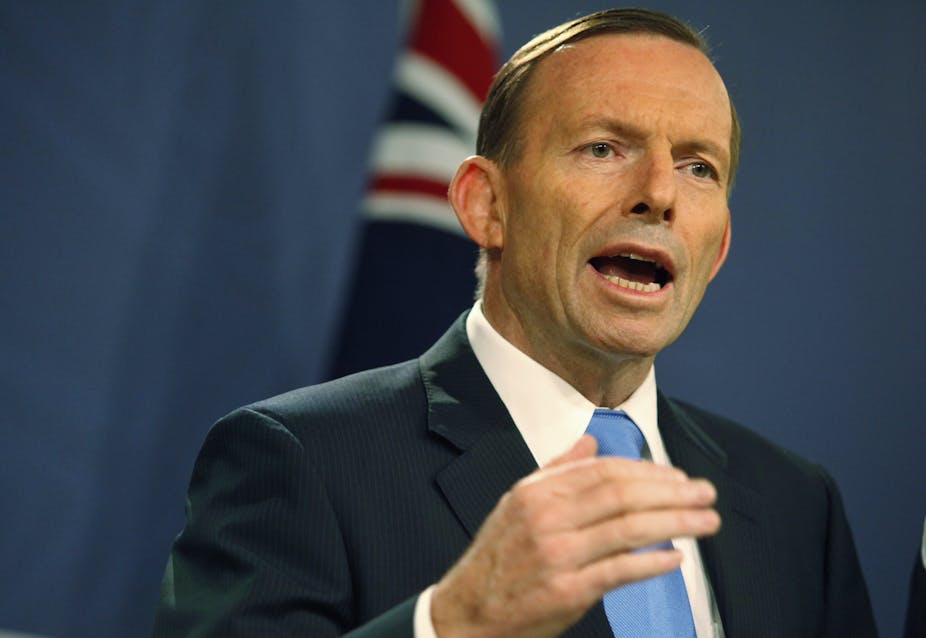Prime Minister Tony Abbott will make a statement to Parliament on Monday on national security developments at home and abroad, as the government prepares to introduce counter-terrorism legislation centred on the problem of foreign fighters.
On Tuesday Abbott leaves for the United States to attend a special session of the United Nations Security Council in New York chaired by Barack Obama, which will discuss the issue. “Eighty nations face the challenge of dealing with foreign fighters,” Abbott said in a video today.
The parliamentary statement will cover last week’s extensive raids, the nation’s largest ever counter-terrorism operation, as well as the pre-deployment of Australian planes and special forces to the Middle East. The main airforce group left today.
Anti-terrorism legislation will be a major theme of the parliamentary fortnight. Attorney-General George Brandis said today the opposition “have offered us bipartisan support” on the measures in the foreign fighters legislation to be introduced on Wednesday.
He said he had briefed shadow attorney-general Mark Dreyfus and Labor deputy Tanya Plibersek in detail last week, adding that he would give Dreyfus the final version of the bill after it went through the Coalition party room on Tuesday.
But Dreyfus said the opposition had not yet agreed to support the legislation.
He said that as he and Plibersek were not shown the bill, he had made it clear to Brandis that nothing he had said should be taken as approval.

“Labor will await the bill and the public consultation on it before making a final decision,” he told The Conversation. But he stressed that Labor would work “co-operatively with the government”.
The bill will give the foreign minister power to proscribe certain places to which people are not allowed to travel without a legitimate reason.
It will also prohibit advocacy of terrorism.
Brandis said he believed the proscribed localities should be “quite narrowly described” rather than being a whole country. “A town or even a village might be the subject of such a declaration.”
He denied that the provision against encouraging terrorism was focused on Islamic preachers.
“This is a law of general application; it is not directed at any section of the community.” It was not about prohibiting people from engaging in political commentary or commentary about international affairs.
“There is all the difference in the world between expressing opinions and urging violence.”
Dreyfus said he wanted to look carefully at this section because there were already criminal provisions covering inciting or encouraging violence and terrorism.
The government already has legislation before Parliament for strengthened anti-terrorism powers. Brandis said the parliamentary intelligence committee reported last week on this agency powers bill and it made 17 recommendations for greater parliamentary and executive oversight of those additional powers.
“The government has accepted all 17 of those recommendations and I have told the shadow attorney-general that. Amendments have been prepared to give effect to the recommendations of the intelligence committee.‘”
Brandis said Abbott had on Thursday night asked the police and ASIO whether they needed further powers. ASIO was satisfied with what was in the legislation while the Australian Federal Police indicated it would like some streamlining of the process for expediting the obtaining of control orders in urgent circumstances. This was something he would talk to acting police commissioner Andrew Colvin about this week. If the government thought the change was needed it would deal with it at the legislation’s committee stage.
A control order allows authorities to impose on a person certain restrictions and requirements (such as wearing a tracking device). Control orders must be issued by a court.
The AFP can apply to the court to issue a control order – the police must have the consent of the attorney-general.
The government wants the agency powers legislation through this fortnight and the foreign fighters legislation passed in coming weeks.

Meanwhile a former senior officer in the army, Jim Molan, who helped the Coalition design its Operation Sovereign Borders policy, suggested the same approach should be used in countering terrorism.
He told Channel Ten that there was a lot of discussion about some kind of super ministry to deal with the counter-terrorism area.
“You can’t do this by committee. You can’t have three or four or five ministers responsible for parts of this.
"If you’re going to learn the lessons of success in Operation Sovereign Borders and joint agency task force, the key thing is a minister who is accountable, has authority and has the resources. Don’t spread it across three or four or five ministers.”
There has been speculation that Immigration Minister Scott Morrison might get such a portfolio in the reshuffle, which is expected before Christmas.
Molan also made it clear that unhappiness with Defence Minister David Johnston had led him to quit as an adviser on the Defence White Paper, but did not spell out the detail of the problem he had.

